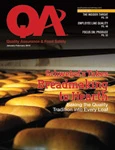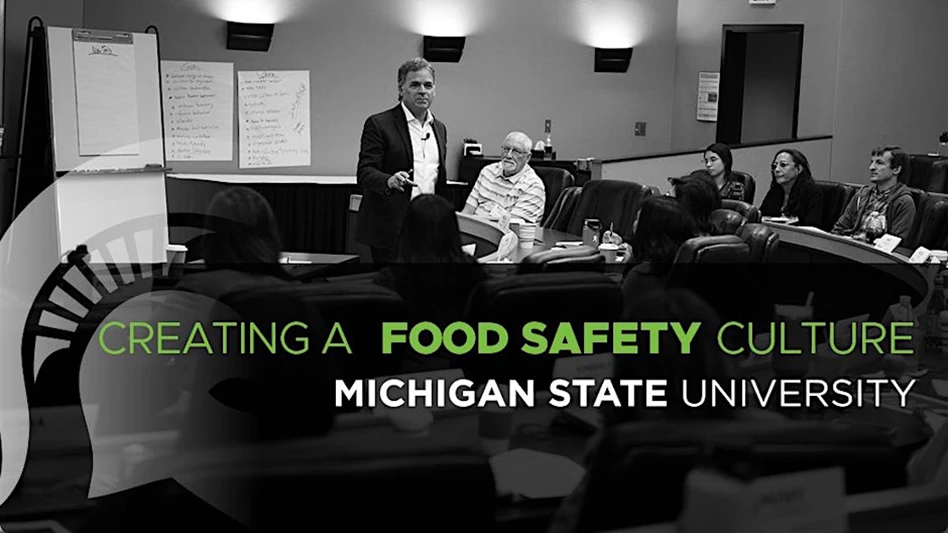Nestlé Enhances Safety for Toll House Cookie Dough
Solon, Ohio–In January, Nestlé USA’s Baking Division began using heat-treated flour in the manufacture of its Toll House refrigerated cookie dough. "Consistent with our quality standards for Nestlé Toll House refrigerated cookie dough, this change will only further
enhance the safety of our products," said General Manager Paul Bakus.
In June 2009, Nestlé voluntarily recalled refrigerated cookie dough after notification from FDA and CDC on their investigation into reported E. coli O157:H7 illnesses that may have been related to raw cookie dough. The product was relaunched in August following a thorough investigation at the Danville, Va., manufacturing facility and implementation of a "best-in-class" testing protocol. On January 11, 2010, Nestlé informed FDA that two samples of the dough manufactured in Danville had tested pos-itive for E. coli, but no finished product was shipped from the factory.
The conversion to heat-treated flour began January 13 with production suspend-ed until the week of January 25, when it utilized the new ingredient. The product is projected to be on store shelves in early March, though the changeover may cause some temporary shortages.
Nestlé informed FDA of its conversion plans and will continue to cooperate with the agency. In addition, Nestlé plans to continue its rigorous testing of ingredients and finished product.
*****
FDA Names New Deputy Commissioner for Foods
Michael R. Taylor, J.D., was named deputy commissioner for foods at the U.S. Food and Drug Administration (FDA) in January. Taylor is the first to hold the position, which was created along with a new Office of Foods in August 2009 to elevate the leadership and management of the foods program. Taylor is a nationally recognized food safety expert, having served in high-level positions at FDA and USDA, as a research professor in academia, and on several National Academy of Sciences expert committees. Taylor returned to FDA in July 2009 as senior advisor to the commissioner. As deputy commissioner for foods, Taylor will help FDA develop and implement a prevention-based strategy for food safety, plan implementation of new food safety legislation, and ensure that food labels contain clear and accurate information on nutrition.
*****
Upcoming Webinar To Discuss Water Activity’s Role in Food Safety
Gain a greater understanding of water activity and its importance in food safety through the April Webinar, "The Basics of Water Activity," presented by Decagon Devices Research Scientist Brady Carter.
In the Webinar, Carter will discuss water activity as an important control measure for microbial spoilage and its importance in government regulation. The presentation will also cover water activity measurement methods and techniques; underutilized applications for water activity in product quality and stability; and new technologies in water activity instrumentation.
Carter was an assistant research scientist at Washington State University prior to joining Decagon. He received his bachelor degree in botany from Weber State University and his master’s degree in cereal chemistry from Washington State.
The Webinar will be presented online, April 22, 11:00 a.m. EDT. More information and registration is available at www.qualityassurancemag.com/events.
*****
Laboratories Detect E. coli at Improved Rates
Traverse City, Mich.—The ability of clinical laboratories to identify E. coli O157:H7 in proficiency testing samples improved significantly over five years. A 2003 study found that 30 percent of laboratory participants failed to detect the E. coli strain even though they were explicitly instructed to test for it. When laboratories were reexamined in 2008 by the American Proficiency Institute (API), 85.3 percent were able to detect the strain.
"We are seeing more laboratories following appropriate testing recommendations and a much better detection rate is occurring," said Daniel Edson, API presi-dent and chief study author. "But there are still improvements to be made."
Edson suggested that laboratories follow screening recommendations from CDC and urged accreditation agencies to include these guidelines in their laboratory inspection checklists.
The study, "Identification of Escherichia coli O157:H7 in a Proficiency Testing Program," was published in Laboratory Medicine.
*****
FDA Unveils First Phase of Transparency Initiative
Washington D.C.—FDA has unveiled the first phase of its Transparency Initiative designed to explain agency operations and how it makes decisions. The curriculum, "FDA Basics," is accessible on its Web site and includes questions and answers about the agency and products it regulates; videos explaining agency activities; and conversations with agency personnel about the work of the office.
Launched in response to the current administration’s commitment to openness in government, the initiative includes a Transparency Task Force which develop its recommendations in three phases. FDA Basics represents the initial phase; the second will be on increasing transparency, usefulness and public understanding; and the third on transparency to regulated industries. More information is available at www.fda.gov/transparency.

Explore the February 2010 Issue
Check out more from this issue and find your next story to read.
Latest from Quality Assurance & Food Safety
- Calbee America Launches California R&D Innovation Center
- PepsiCo Completes Acquisition of Siete Foods
- Non-GMO Project Launches Non-Ultraprocessed Foods Verification
- FDA to Hold Webinar on Updated ‘Healthy’ Claim
- High-Tech Partnership Creates Natural Blue Color for Greener Tomorrow
- Kraft Heinz Hosts Innovation Challenge for Sustainable Packaging
- FDA Requests Information on Poppy Seeds
- Danone North America Opens Applications for Annual Gut Microbiome, Yogurt and Probiotics Fellowship Grant





